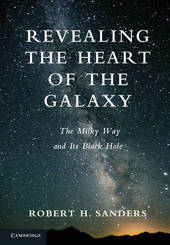
|
Revealing the Heart of the Galaxy: The Milky Way and its Black Hole
Hardback
Main Details
| Title |
Revealing the Heart of the Galaxy: The Milky Way and its Black Hole
|
| Authors and Contributors |
By (author) Robert H. Sanders
|
| Physical Properties |
| Format:Hardback | | Pages:204 | | Dimensions(mm): Height 262,Width 182 |
|
| Category/Genre | Cosmology and the universe
Galaxies and stars |
|---|
| ISBN/Barcode |
9781107039186
|
| Classifications | Dewey:523.1 |
|---|
| Audience | | Tertiary Education (US: College) | | General | |
|---|
| Illustrations |
40 Halftones, unspecified; 39 Line drawings, unspecified
|
|
Publishing Details |
| Publisher |
Cambridge University Press
|
| Imprint |
Cambridge University Press
|
| Publication Date |
25 November 2013 |
| Publication Country |
United Kingdom
|
Description
Written in an informal and engaging style, this volume traces the discoveries that led to our understanding of the size and structure of the Milky Way, and the conclusive evidence for a massive black hole at its center. Robert H. Sanders, an astronomer who witnessed many of these developments, describes how we parted the veil of interstellar dust to probe the strange phenomena within. We now know that the most luminous objects in the Universe - quasars and radio galaxies - are powered by massive black holes at their hearts. But how did black holes emerge from being a mathematical peculiarity, a theoretical consequence of Einstein's theory of gravity, to become part of the modern paradigm that explains active galactic nuclei and galaxy evolution in normal galaxies such as the Milky Way? This story, aimed at non-specialist readers and students and historians of astronomy, will both inform and entertain.
Author Biography
Robert H. Sanders is Professor Emeritus at the Kapteyn Astronomical Institute of the University of Groningen, the Netherlands. Author of The Dark Matter Problem: A Historical Perspective (Cambridge University Press, 2010), Sanders has spent his career studying the orbit structure in barred galaxies, active galactic nuclei, and the problem of the mass discrepancy in galaxies. He received his PhD in astrophysics from Princeton University.
Reviews'In his captivating book Sanders gives an authoritative and entertaining, easy-to-read account of this 'detective story', from the beginnings in the last century to the most recent developments. As he tells his story, [he] conveys to the reader the fascination of research, the often unexpected discoveries, but also the meandering path of the research towards better understanding and knowledge, including the 'human' side of some of the major players in the story. I highly recommend this book to readers who want to understand and get captivated by one of the highlight discoveries of modern astronomy.' Reinhard Genzel, Max Planck Institute for Extraterrestrial Physics 'This book gives a personal enthusiastic and well informed view of the exciting discoveries in astronomy since 1950. Major advances in astronomy are led by technology, but the theme of this engagingly written book is the development of ideas, and how they are tested and refined as new observations become possible. Sanders' central subject is the revelation of the structure of our Milky Way galaxy with its 'rather small' four million solar mass central black hole. However the reader will gain also insight into how astronomy and science develop via world-wide cooperation and debate. It is fun to read!' Donald Lynden-Bell, University of Cambridge 'Sanders ... [inserts] helpful summaries after particularly dense sections. Those interludes contain charmingly personal reflections on both the practice and development of astronomy and help to ensure that interested readers of all backgrounds can share in the thrill of a wondrous discovery.' Matthew Walker, Physics Today '... even readers familiar with the subject will probably learn something new but at the same time the book is accessible to a general readership ... I enjoyed reading the book and recommend it.' The Observatory 'Highly recommended.' S.P. Maran, Choice
|